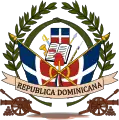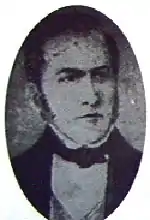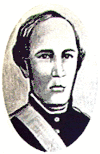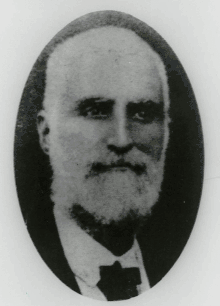Dominican Republic Spanish: República Dominicana | |||||||||||||
|---|---|---|---|---|---|---|---|---|---|---|---|---|---|
| 1844–1861 | |||||||||||||
 Map of Hispaniola from 1858. | |||||||||||||
| Status | Dominican territory | ||||||||||||
| Capital | Santo Domingo | ||||||||||||
| Common languages | Spanish | ||||||||||||
| Demonym(s) | Dominican | ||||||||||||
| Government | Unitary presidential republic | ||||||||||||
| President | |||||||||||||
• 1844–1848 (first) | Pedro Santana | ||||||||||||
| History | |||||||||||||
• proclamation of the Dominican Republic | 27 February 1844 | ||||||||||||
| 18 March 1861 | |||||||||||||
| Currency | Dominican peso | ||||||||||||
| ISO 3166 code | DO | ||||||||||||
| |||||||||||||
The First Dominican Republic,[1] was a predecessor of the currently existing Dominican Republic, and began on 27 February 1844 with the proclamation of the Dominican Republic, and culminated on 18 March 1861 with the annexation of the country to Spain. During these 17 years the nation was economically and politically unstable due to prior war against Haiti and internal conflicts. There were 8 governments (3 of which corresponded to Pedro Santana and 2 to Buenaventura Báez).
The era of the First Republic was a period of great importance in the country's history, as it marked the beginning of its independent life. This stage spanned from 1844 to 1861. The independence of the Dominican Republic was proclaimed on February 27, 1844, when a group of patriots led by Juan Pablo Duarte and other prominent Dominican leaders rebelled against Haitian rule. This proclamation marked the end of the Haitian occupation of Santo Domingo, leading to the establishment of the new nation. [2]
After independence, the new Dominican Republic faced a series of challenges, including the construction of a stable political system and the organization of the State structure. During this stage, the country's first Constitution was promulgated in November 1844, which established a republican and democratic system.
History
Proclamation of Independence
The Trinitarios proclaimed the independence of the Dominican Republic on 27 February 1844, with a shot fired by Matías Ramón Mella in the Puerta de la Misericordia in the city of Santo Domingo. Immediately afterward, they went to the Puerta del Conde, where Francisco del Rosario Sánchez lifted the national flag and where the Dominican Act of Independence was read and sworn. The next day, on 28 February, the Haitian authorities surrendered.
Economy
The First Republic was a period characterized by relative economic stability in the country. During this time, the Dominican economy was based primarily on agriculture, especially the production of sugar, coffee, and tobacco. These products were exported to other countries, which generated income for the development and growth of the country. Sugar production was especially important during this period, as the Dominican Republic became one of the main sugar producers in the Caribbean. This attracted foreign investments and contributed to the country's economic growth.[2]
In addition to agriculture, other economic activities were also developed, such as mining and trade. Deposits of gold and silver were discovered in some regions of the country, which attracted miners and businessmen interested in exploiting these resources. Trade also benefited, as trade relations were established with other countries in the region and ports were built to facilitate the exchange of goods.[2]
A period of economic stability was experienced during the First Republic of the Dominican Republic , driven primarily by agricultural production, mining, and trade. These factors contributed to the growth and development of the country at that time. [2]
Presidents
| Santana
|
Jimenes
|
Santana
|
Báez
|
Santana
|
Regla Mota
|
Báez
|
Desiderio Valverde
|
|---|---|---|---|---|---|---|---|
| 1844 | 1848 | May 1849 | September 1849 | 1853 | 1855 | 1856 | 1857 |
| Santana
| |||||||
| 1858-1861 |
See also
References
- ↑ Negocios Dominicanos (2014). La Primera República. Negocios Dominicanos.com. Retrieved February 15, 2014.
{{cite book}}:|work=ignored (help) - 1 2 3 4 Redacción (January 2, 2023). "Historia de la República Dominicana: Primera República (1844-1861)". HistoriaUniversal.org (in Spanish). Retrieved November 7, 2023.
.svg.png.webp)





